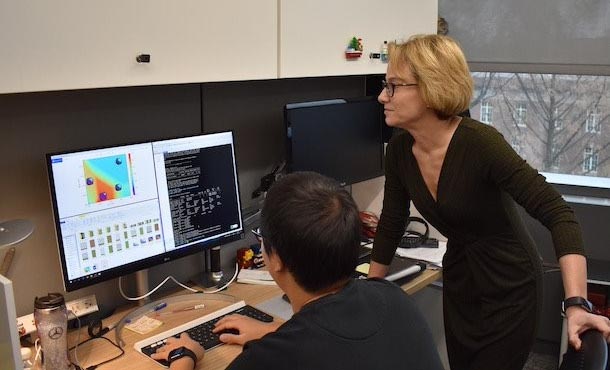
Kristen Fichthorn, Penn State Merrell Fenske Professor of Chemical Engineering and professor of physics, at right, reviews a graduate student's research. IMAGE: JAMIE OBERDICK/PENN STATE
Chemical engineering professor receives nanoscale science and engineering award
12/11/2019
By Jamie Oberdick
UNIVERSITY PARK, Pa. — Kristen Fichthorn, Penn State Merrell Fenske Professor of Chemical Engineering and professor of physics, recently received the 2019 Nanoscale Science and Engineering Forum Award from the American Institute of Chemical Engineers (AIChE).
The recognition statement for the award declared that Fichthorn received the honor “for elegant elucidation of the thermodynamics and kinetic mechanisms of shape-selective nanocrystal growth in solution using quantum and classical theory and simulations.” Her research focuses on understanding metal nanocrystal syntheses using theory and computer simulations.
Fichthorn received the award at the 2019 AIChE Annual Meeting, held Nov. 10-15. Along with receiving the award, she also gave an invited lecture titled “Growth of Nanoscale Materials: Insights from Multi-Scale Theory and Simulation.”
“It is a great honor to be recognized for this work, which has been made possible by continued support from the U.S. Department of Energy and the efforts of talented graduate students and postdocs here at Penn State,” said Fichthorn.
Metal nanowires are used in electronics such as touch screens because they are flexible, optically transparent and highly conductive. Nanocrystals are highly active and selective as catalysts, so they are also effective as components of solar cells and sensors. Metal nanocrystals that are precisely synthesized into specific shapes and sizes for particular applications hold potential for other uses, such as smart windows that can be tinted electronically and new methods of saltwater desalination. However, only a handful of technologies currently harness this potential because it is difficult to achieve high, selective yields of precisely engineered metal nanocrystals.
Part of the reason for this is the lack of a single theoretical method that can describe the many aspects of a typical nanocrystal synthesis, which is highly complex. Fichthorn has met this challenge by stitching together various theoretical methods to describe these syntheses using multi-scale modeling. Multi-scale modeling uses multiple models at different temporal and spatial scales to describe a system or process.
Fichthorn has found that multi-scale modeling is effective with nanocrystal synthesis because she uses different techniques of study to probe length and time scales ranging from those of electrons and atoms (angstroms and picoseconds) to individual nanocrystals (nanometers and microseconds) to entire nanocrystal syntheses (which occur over human length and time scales). Her studies, by themselves or in combination with experiments, have potential to enhance capabilities to design and successfully synthesize specific forms of metal nanocrystals.
“Kristen’s work is so significant because it transformed the growth of shape-controlled nanoparticles from a descriptive, empirical field to a science,” said Phillip Savage, head of the Department of Chemical Engineering and Walter L. Robb Family Endowed Chair. “Her lab framed the key scientific issues, developed the necessary computational approaches, performed the key calculations, and, along with collaborators, provided convincing experimental validation.”
Fichthorn received a bachelor of science in chemical engineering from the University of Pennsylvania in 1985 and her doctoral degree in chemical engineering from the University of Michigan in 1989. She spent one year as an IBM postdoctoral fellow in the University of California Department of Chemical Engineering before joining the Penn State Department of Chemical Engineering in 1990.
In addition to being recognized by Penn State for her outstanding research and teaching, she is the recipient of the National Science Foundation Presidential Young Investigator Award (1990) and an Alexander von Humboldt Foundation Research Fellowship (1998). She is a fellow of the American Physical Society (2011) and a fellow of the American Institute of Chemical Engineers (2017).


